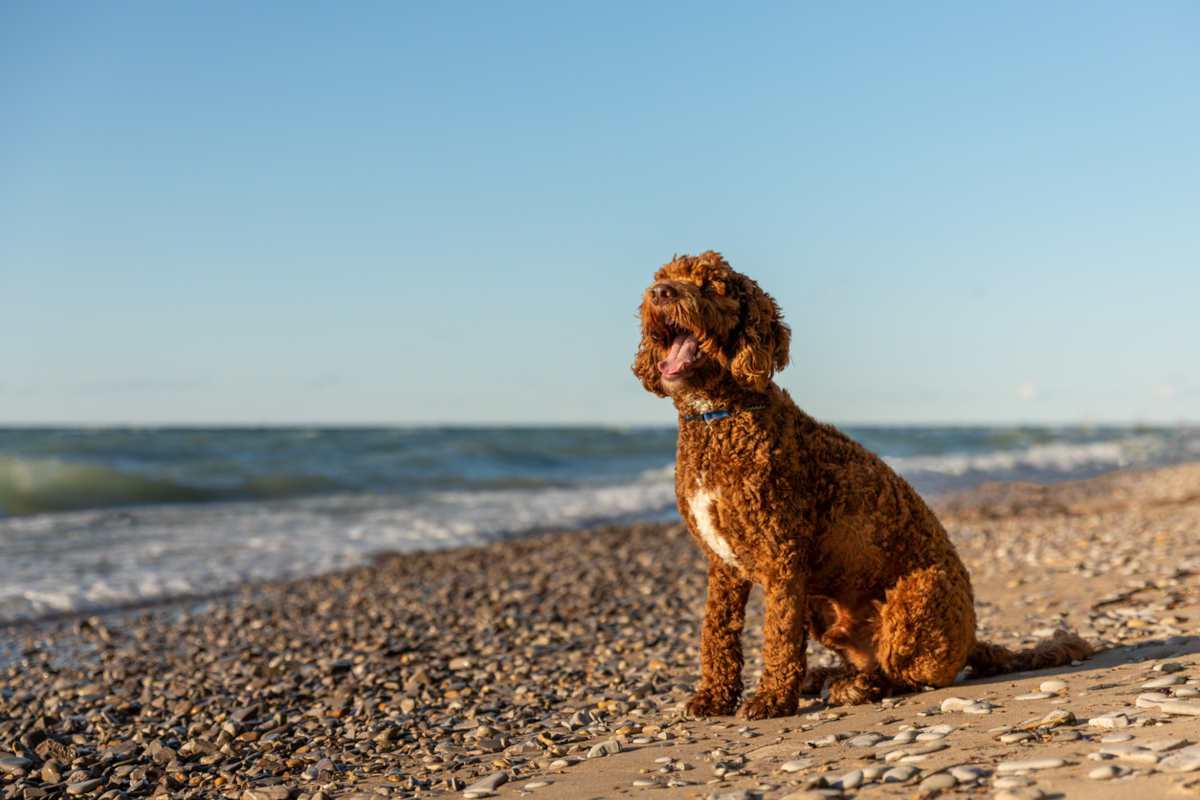If you're taking your beloved pet on holiday this summer, canine behaviourist Jackie Murphy has plenty of advice to ensure it stays fun for everyone.
Whether it's a beach holiday, countryside escape or a spot of sight-seeing, taking our pet on holiday means that we can enjoy all sorts of adventures as a family – but there are a few things to think about to ensure your pet is happy and safe.
Planning a pet-friendly holiday
Before you make any travel plans, consider taking your dog for a veterinary check-up to make sure that they are fit and healthy. This also means you can double-check on any boosters and other travel requirements.
It's also a good time to run through their things, including their leads, collars and harnesses (which can get worn), and check they have enough food, treats, medication and poo bags.
There are lots of places in the UK that are dog-friendly, from pubs and cafés to tearooms and various attractions.
- English Heritage has dog-friendly sites all over England, allowing the whole family to enjoy a day out.1
- The National Trust offers lovely places to walk your dog, as well as places to stay.2
- Visit the seaside. The Beach Guide is a great place to find beaches that your dog can visit.3
- All About Dogs hosts a number of shows, with lots of different activities to watch, as well as join in, in different locations around the UK.4

Check which beaches are dog-friendly, then treat your dog to a paddle.
Safe travels
Dog car travel
Keeping everyone safe in the car is the number one priority. This means securing your dog with a good-quality crate or seatbelt body harness.
A standard body car harness will attach to the seat belt in the car and restrain your dog, although he or she can still lie down. A crate can be purchased or specially made to fit your car, and are normally put in the boot.
Whichever one you choose, it's important to get your pet used to the crate or harness. Practice using it indoors, then progress to short car journeys before gradually increasing the length of the journey. Offer some tasty treats as an incentive and always take them to fun places such country walks or to visit doggy friends, so they associate the car with good things.
If your dog suffers with sickness due to travelling, it may be useful to have a chat with your veterinary surgeon for some suitable medication, or try MagiCalm, with soothing magnesium, B vitamins and chamomile.

MagiCalm
For naturally calmer and less anxious dogs
- Magnesium to lower muscle tension, B vitamins for psychological wellbeing and relaxing chamomile
- Beef flavour enhanced with brewer's yeast
- Can help to calm your dog in stressful situations
- Have a few quiet stopping places in mind, so everyone can get some fresh air and stretch their legs. This also helps dogs to de-stress – dog anxiety in car rides is not unusual.
- Keep the car well-ventilated, but do not allow your dog to put their head out of the window. It is dangerous and can lead to eye injuries.
- Car rides can be boring – make sure that no one teases or annoys the dog in the car, and that your dog has some toys to play with.
Travelling by boat with your dog
If you plan on travelling by boat, it's worth checking the rules before you go; other than assistance dogs, the majority are not allowed out of the vehicle on a ferry crossing. DEFRA (the Department for Environment, Food & Rural Affairs) is a good source of information for travelling abroad.5
As a first port of call, make sure that you have the following:
- A muzzle for your dog, as this may be a requirement when your dog is outside your vehicle.
- Absorbent bedding for the crate or the area of the car that your dog will be left in. It may be useful to have two sets of absorbent bedding, just in case.
- Safe toys to help your dog feel comfortable, and perhaps one of your old t-shirts, as your scent will help them relax.
- A water container that is non-spill so that it can be attached to the crate or area of the car where your dog will be placed.
It's always worth checking with your train company, but for the most part dogs are allowed on trains in the UK. If you're taking a dog to France, Eurostar currently doesn't allow dogs to travel, unless they are a guide or assistance dog. For more advice, the Blue Cross has a comprehensive guide for travelling by train with pets.6
You have reached your destination!
When you arrive, it's important to help your pet settle into their new surroundings.
Make sure that while you are unpacking the car, you keep your dog in a safe area (such as a room or enclosed garden with a member of the family) or perhaps get someone to take them for a walk while you unpack. Even if they appear settled and do not normally show destructive behaviour, do not leave them alone.
Throughout your stay, it's important to make sure they have a quiet corner with a few of their favourite toys and blankets, so they can retreat from the hustle and bustle if needed.
Staying safe out and about
As you settle into holiday mode, it's important to stay vigilant about your dog's safety. Familiarise yourself with your surroundings, so you know if there are livestock, busy roads, cliff edges or other dangers nearby.
In addition, remember to take care with the temperature. Look at exercising your dog when it's cooler (normally early morning and early evening), ideally on routes that include shade or water (just check for river currents, algae or tides). Dogs with darker coats or who are overweight are particularly vulnerable to the heat; look out for excessive drooling, heavy panting, trouble breathing and lethargy, which are all signs of overheating. Never leave your dog in the car.
It's always worth brushing up on their training. Two vital commands are 'settle' (useful for cafés and restaurants) and 'come', which means that even when you're visiting different environments that are really exciting for your dog, they will still return when called.
A final word…
Many dogs love to travel with their owners, but each dog is an individual and, in some cases, it might be kinder to leave your dog at home with a pet sitter. Medical issues, old age or temperaments that do not adapt well to change are all valid reasons. Do your research – on kennels or on pet sitters – so you can rest easy that your dog is being well looked after.







